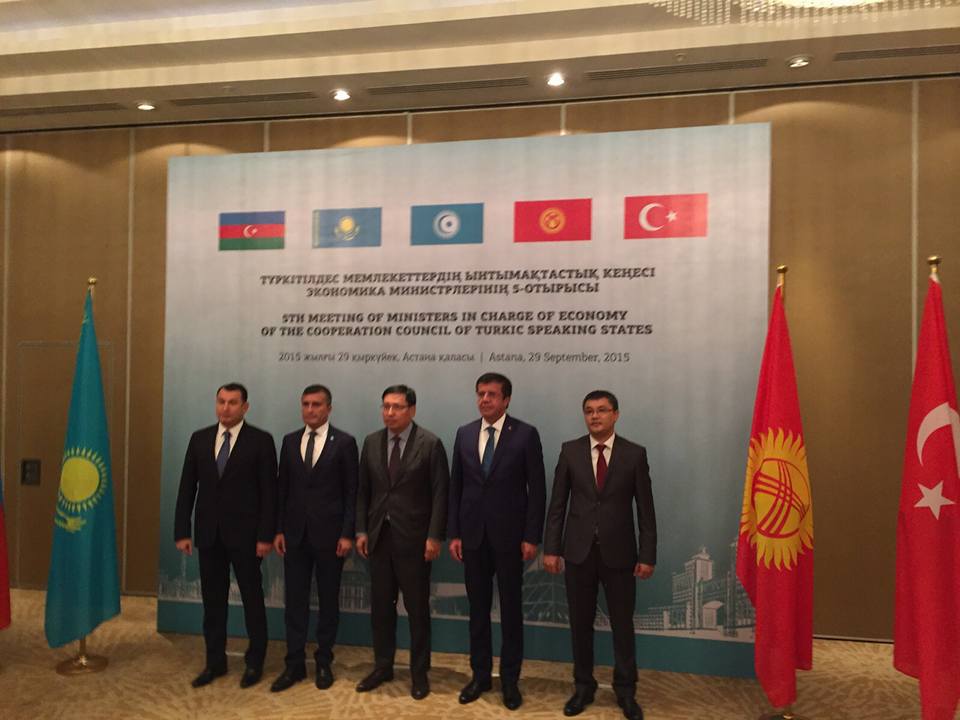Turkic-speaking states can develop mutual trade relations by reducing barriers

By Aynur Karimova
Turkic-speaking states have been offered the opportunity to reduce barriers to mutual trade in a statement by Kazakh National Economy Minister Yerbolat Dossayev at the fifth meeting of economy ministers of the Cooperation Council of Turkic-Speaking States in Astana on September 29.
The strengthening of multilateral trade and economic cooperation between the member-states of the Turkic Council, the interaction of working groups to improve the investment climate, economic diversification, the development of entrepreneurship, and the establishment of a joint investment fund were high on the agenda of the meeting.
Turkish Economy Minister Nihat Zeybekci, Azerbaijan's Deputy Economy and Industry Minister Sahib Mammadov, Kyrgyz Deputy Economy Minister Daniyar Imanaliyev, as well as Turkic Council Deputy Secretary General Omer Kocaman attended the meeting.
Following the meeting, event participants signed several documents, including memorandums of understanding on cooperation in investment statistics, the exchange of experience in the investment sector, as well as a MoU between small and medium-sized public enterprises operating within Turkic Council member-states.
Integration between the multi-million-strong Turkic-speaking nations, spread across northern, eastern, central, and western Asia, northwestern China, the Caucasus, Russia, Turkey, and parts of Eastern Europe, has been intensifying.
Based on a shared history and culture, the Turkic-speaking countries of Azerbaijan, Kazakhstan, Turkmenistan, Turkey, and Kyrgyzstan are successfully cooperating through organizations such as TurkPA and TURKSOY, alongside the Turkic Council in the humanitarian, cultural, economic, and trade fields.
Today, the Turkic-speaking countries are taking steps toward the revival of common roots and are implementing joint projects in this regard. They also enjoy great potential in economic interaction. Covering a vast area, these countries possess an abundance of natural resources and have great prospects for transit and infrastructure. Turkmenistan, Azerbaijan, and Kazakhstan, in particular, have significant hydrocarbon resources and are interested in exporting them to European markets.
Azerbaijan, which has an excellent geographical position and a developed infrastructure, serves as a direct route to gas-hungry Europe. A complex approach and canny organization is of great importance in this regard.
Turkic-speaking states have historically been strategic trade partners for centuries, using traditional transportation means such as caravans of camels and horses. Turks traversed the sun-scorched steppes and deserts of Central Asia along the Great Silk Road from China to Europe to exchange silk for medicines, perfumes, and precious stones.
The strategic unity of the Turkic-speaking countries has enabled a revival of the Great Silk Road, taking only 15 days for trains to transport containers carrying electronic goods, construction materials, and other cargo to their final destination in Europe. Beginning in Chongqing in southwest China, this road covers 10,800 kilometers to reach Duisburg in Germany's industrial Ruhr region.
Azerbaijan, which is located at the crossroads of East and West, also plays a crucial role in these international transport routes. The country ferries hydrocarbons from Kazakhstan and Turkmenistan and seeks to contribute even more to this transportation corridor by creating a modern infrastructure. A new international trade seaport is currently under construction in Baku. The total capacity of this port will be 25 million tons. At the same time, the construction of the Baku-Tbilisi-Kars railway is underway.
The Turkic Council, a new union of countries bound together by ethnicity and a common history and culture, was established in 2009 as an international intergovernmental organization, with the overarching aim of promoting comprehensive cooperation among Turkic-speaking countries. The Turkic Council has the potential to become a more successful union than ever before.
--
Aynur Karimova is AzerNews’ staff journalist, follow her on Twitter: @Aynur_Karimova
Follow us on Twitter @AzerNewsAz
Here we are to serve you with news right now. It does not cost much, but worth your attention.
Choose to support open, independent, quality journalism and subscribe on a monthly basis.
By subscribing to our online newspaper, you can have full digital access to all news, analysis, and much more.
You can also follow AzerNEWS on Twitter @AzerNewsAz or Facebook @AzerNewsNewspaper
Thank you!
